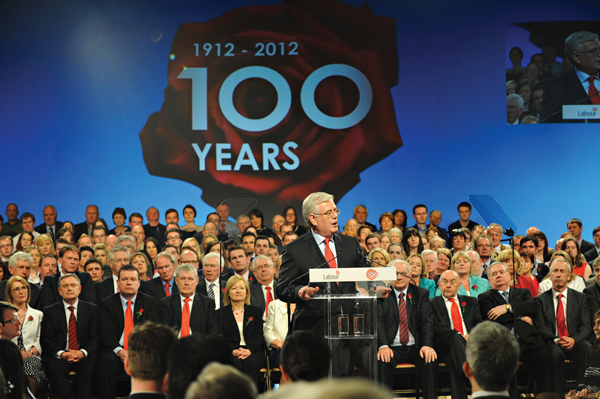The Labour Party’s centenary
The Labour Party marked its 100-year anniversary while acknowledging that more difficult decisions are ahead in order to lead Ireland to recovery.
Ireland “is going to recover,” Eamon Gilmore told the Labour Party’s centenary conference on 14 April.
Amid protests outside NUI Galway’s Bailey Allen Hall over turf cutting and the septic tank and household charges, Gilmore told the party faithful: “‘Don’t pay’ might sound good as a slogan and look sharp on a placard. But it is neither smart, nor sensible, nor a solution because if you refuse to pay today, you can hardly expect to borrow tomorrow.”
In his first few weeks in government, Gilmore feared “that we would topple over the cliff, and that it might take generations to recover.” However, by stabilising the economy and finances, “we have now succeeded in pulling it back from the edge.”
He recalled that 100 years ago, Labour’s founders James Connolly and Jim Larkin had fought for “the freedom to work, the freedom to have a home, the freedom to learn.” Those are the causes “to which we are called once again,” he told delegates.
A special centenary video cited Labour’s achievements, which included:
• leader, Tom Johnson being the author of the Programme for Government in the first Dáil;
• Jim Larkin’s work on eradicating poverty, which is “the lasting legacy of the party”;
• James Connolly’s 1916 “sacrifice”, which “put Labour at the forefront of politics”;
• the election of Mary Robinson as President of Ireland in 1991, making her the first woman President and the first not to be nominated by Fianna Fáil;
• the election of Michael D Higgins as Galway West TD in 1981 and his subsequent election as President in 2011;
• Labour’s time in coalition government with Fine Gael under Dick Spring from 1982-1987;
• being “the first party to recognise that divorce is a civil liberty”;
• Ruairí Quinn’s tenure in the Department of Finance from 1994 to 1997; and
• achieving a record number of seats (37) in the 2011 general election.
The party also points to Mervyn Taylor, as Minister for Equality and Law Reform introducing the Employment Equality Bill 1993, and Proinsias De Rossa as Minister for Social Welfare introducing the National Anti-Poverty Strategy in 1997.
Successes in the last 13 months included increased exports, opening up new markets such as China, lowering the interest rate on the EU-IMF deal and replacing the €3.1 billion Anglo promissory note owed this year with a long-term bond.
The party’s support for a ‘yes’ vote on the Fiscal Compact Treaty referendum is explained by its desire to bring stability to the euro.
In the wake of the Mahon Tribunal’s findings, speakers reiterated that “no wrong-doing has ever [been] attached to the Labour Party.” However, Aodhán Ó Ríordáin did point out that when Dublin County councillor John O’Halloran’s voting record on planning matters came into question, he was expelled from the party in 1993.
Discontent at the move away from the party’s traditional rhetoric was evident in debating and voting on the 159 motions. Motions that were critical of government policy were ‘referred back’ to the party’s central council. Party Chairman Brian O’Shea refused to count a vote following a show of hands on Brendan Howlin’s call to ‘refer back’ a motion rejecting austerity and calling for expansionary fiscal policy. Delegates then booed and interrupted voting on other motions. Howlin’s next call to ‘refer back’ a motion to oppose the sale of semi-state assets “under any circumstances” was opposed 158 to 152. The motion was then carried by majority on a show of hands.
A central council motion in support of Social Protection Minister Joan Burton commended the JobBridge scheme. While that motion was passed unanimously, a motion from the Clare constituency council, claiming that the scheme leaves participants “open to abuse and exploitation,” was withdrawn.
Former Siptu official and current Galway East TD Colm Keaveney won the party Chairman contest, receiving strong support from the trade unions. Choosing the outspoken TD was generally viewed as a snub to the leadership as the other two contenders (Brian O’Shea and Derek Nolan) are closer to the hierarchy.
Unanimous approval was given to motions calling for media plurality, a carers’ strategy and a human rights dialogue event in China during the Irish Presidency of the Council of the European Union.
Best wishes were sent by MEP Emer Costello to François Hollande, the Socialist Party candidate in the French Presidential elections.
Pointing to forthcoming legislation on whistle blowing, lobbying and freedom of information, Brendan Howlin said: “It took Fianna Fáil 14 months to destroy our economy and undermine our politics. It will take is more than 14 months to put things right.”
The party leader emphasised that it will take “more than budget discipline to get the economy moving again” and reminded delegates that now is the time “for effort and endurance; persistence and patience; for serious application to the job.”






